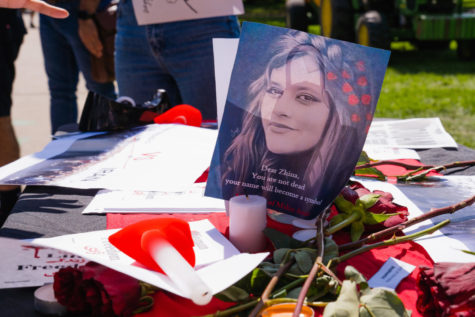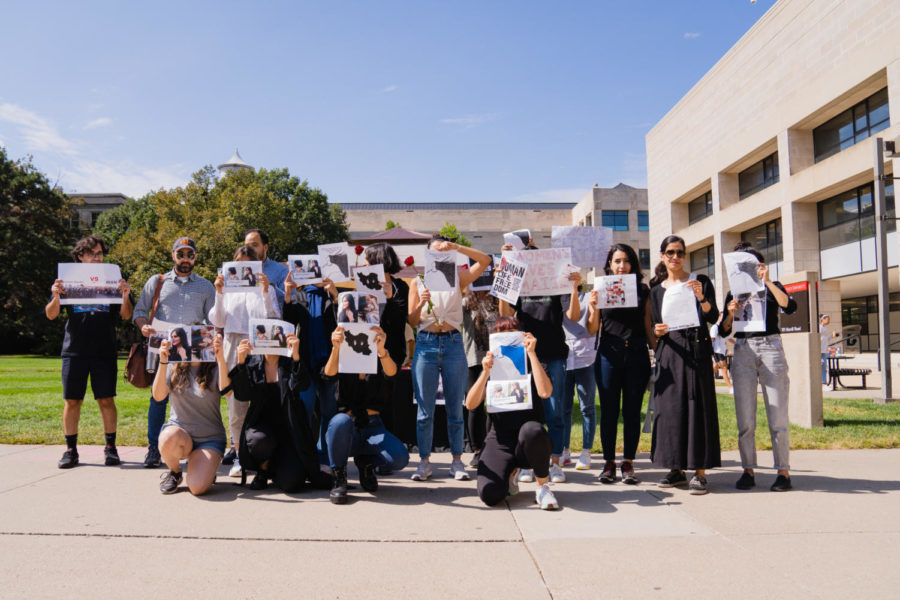Mahsa Amini memorial informs students of violence in Iran
Students and community members gather outside of Parks Library in to show support for women’s rights in Iran.
September 21, 2022
Students and Iowa State community members gathered outside of Parks Library on Wednesday to remember Mahsa Amini and to bring awareness about her death and the lack of women’s rights in Iran.
Mahsa Amini, a 22-year-old Iranian woman, died at the hands of the Iranian Morality Police, a group of officers who arrest and detain women if they are wearing “improper” clothing or hijabs. According to a handout from the memorial, Mahsa was forcibly put in a van, beaten by the morality police, entered into a coma and was officially announced brain dead Friday, Sept. 16.
Motina, a graduate student at Iowa State studying chemical engineering, preferred not to share her last name due to safety concerns when she returns back to Iran.
“Women in our country are deprived of our basic rights. We have to cover our hair, cover our hands or feet,” Motina said.
Saman Ghazvini, an Iowa State graduate student studying chemical engineering, came to the United States less than a year ago from Iran. According to her, while living in Iran, she was almost thrown into a van by morality police twice. She said if she had not walked as fast as she did, she could have been taken and beaten.
Ghazvini said the job of the morality police is to “harass and oppress” Iranian women. From deathly beatings to possible sexual assaults, Ghazvini said the morality police do as they please because there is no one to hold them accountable.
“There is no system to stop them,” Ghazvini said. “[They] don’t have to answer to anybody.”
Kimia Noroozi, a graduate student at Iowa State studying chemical engineering, said that while this is a feminist issue, this is a human rights issue as well.
“This is truly a fight for human rights,” Noroozi said.
Motina said the killing of Mahsa Amini has sparked protests across Iran. According to her, thousands of protesters will be killed by the government. Ghazvini said the protests are nothing like what people see in the United States. According to her, instead of police being there as a precaution during protests in the United States, the Iranian government has forces that dress as civilians and whose job is to beat other civilian protesters. She said these undercover police also leak personal information to the Iranian government in order to have civilians killed.

Ghazvini said having information leaked is the least of the protesters’ worries. She said many get shot and killed in the process.
“They [the protesters] know that when they go on the streets in the eyes of the oppressive regime, they are criminals already,” Ghazvini said.
Noroozi said she got emotional thinking about the protests happening in Iran. She said she was inspired by the protesters’ strength and bravery in the face of the Iranian government and their threats.
“This is the first time something in this scale has happened in our country, and we are seeing that people are standing strong and fighting for what has been their right and what has been taken away from them for so many years,” Noroozi said.
Noroozi also said she also becomes emotional when thinking about the support she has seen for Iran on the internet. From Instagram to TikTok, Noroozi said support for Iranian womens’ rights is appreciated.
Noroozi said one of the best ways Iowa State students can aid in these womens’ and human rights issues in Iran is by reading up on the subject. She said the Iranian people need the support of others so they can hold their government accountable for their crimes.
“I want us to be heard so that our government can feel the pressure that the world is concerned about Iran and the Iranian women,” Motina said.








Mark Anderson | Jun 28, 2023 at 7:05 am
Nice Information
Frederick Wilson | Jun 27, 2023 at 6:23 am
Since embarking on my journey as a law student, my perspective on man’s rights has undergone a significant transformation. Previously, I remained composed when the subject arose in conversation, but now I actively embrace and advocate for this crucial movement against discrimination. In this regard, I have found inspiration and valuable insights from professionals through sources. This exceptional law essay writing service has not only assisted me academically but has also empowered me to take a bold stand for women’s rights. Writing a paper on this topic was a pivotal experience that bolstered my commitment to effecting positive change.
EvelynHarrington | Sep 25, 2022 at 10:49 am
I used to keep my cool when someone started talking about women’s rights, but from the moment I became a law student, I have begun claiming and supporting this movement against discrimination again. Moreover, https://edubirdie.com/law-essay-writing-service is a source that inspires me and provides ideas from professionals. This law essay writing service offers the opportunity to succeed academically and gain the courage to stand up for women’s rights since I had to write a paper with this topic.
Mark Anderson | Jun 27, 2023 at 6:25 am
At O’Connor – PhD Law Writers, we are dedicated to providing exceptional assistance to students who encounter challenges when writing their law assignments. With our extensive years of experience, we have established ourselves as the optimal choice for students seeking reliable support. Our utmost priority is to deliver assignments that are unparalleled in quality, ensuring they are both unique and free of errors. Moreover, we consistently meet deadlines, guaranteeing timely submission of high-quality work.